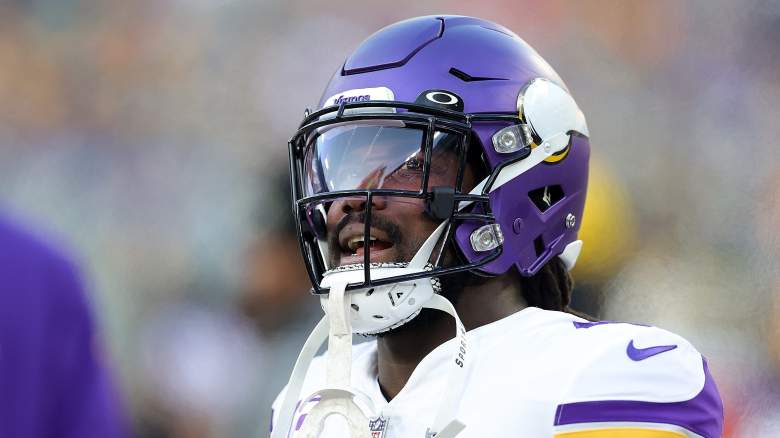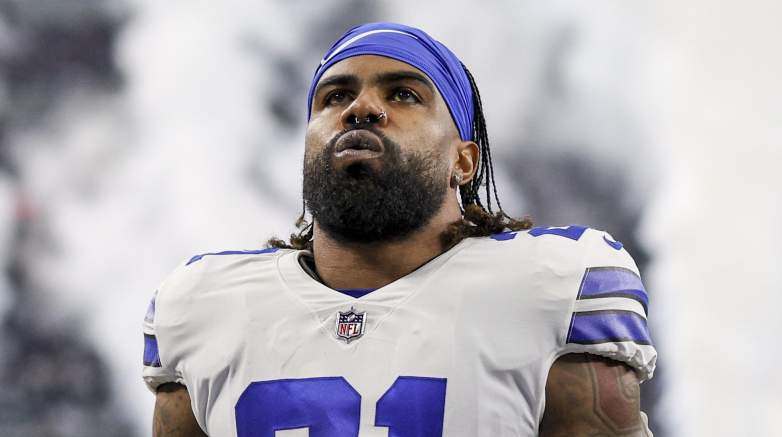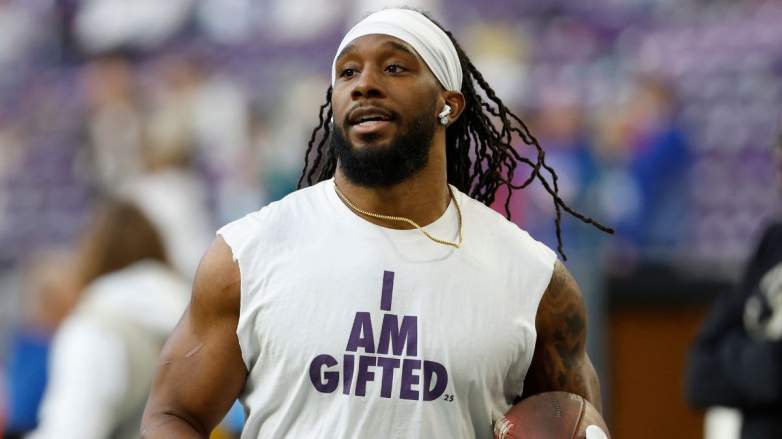
Getty Minnesota Vikings running back Dalvin Cook.
The Minnesota Vikings made the difficult decision to release Dalvin Cook this week to become more financially flexible in future years, leaving the Vikings’ backfield vacant of a Pro Bowl running back.
The decision came down to the fact that Cook wasn’t consistently efficient enough on his runs to warrant a $14.1 million cap hit that ranks second at his position this season. Another team will reap the benefits of signing Cook to a discounted deal.
But the Vikings can with another veteran running back as well.
Longtime Dallas Cowboys running back Ezekiel Elliott remains a free agent after the Cowboys released him to save $10.9 million in cap space. As Elliott wavers in free agency, the league has come to a consensus that overpaying for a running back is not a winning move in today’s NFL.
And that could work to the Vikings’ advantage.
CBS Sports’ Jeff Kerr suggested Minnesota could be a potential landing spot for Elliott, who would likely be asked to take a short-yardage role in a Vikings offense that is looking for more efficiency in 2023.
“With the Vikings cutting ties with their own long-time Pro Bowl running back, there is an opening for a player to be a complement to Alexander Mattison. Minnesota drafted Ty Chandler and DeWayne McBride the past two years, though, and still has electric return man Kene Nwangwu (nominally a running back) on the roster as well,” Kerr wrote. “If there were a role for Zeke here, it would likely be as a short-yardage back, but we don’t know how interested either he or the Vikings would be in that proposition.”
Ezekiel Elliott, Dalvin Cook’s Drop Off Opens Avenue for Teams to Sign Vets for Cheap

GettyEzekiel Elliott of the Dallas Cowboys.
Elliott, 28, is far from the player he once was when he garnered top dollar at his position, signing a six-year, $90 million deal in 2019.
In Elliott’s first four seasons with the Cowboys, he averaged 4.6 yards per attempt and 96.5 yards per game. In the three years since signing that extension, he averaged 4.0 yards per attempt and 60.8 yards per game.
Dallas may have even been a year behind in releasing Elliott who was on an inflated contract that did not match his efficiency running the ball.
Minnesota may be a year ahead of that trend with Cook. Whatever Cook does next season will reflect upon the Vikings. However, the signs of regression had hit Cook as well.
Despite playing all 17 games and showing he can still be an explosive playmaker, Cook led the NFL with 62 rushes of zero or negative yards, nearly a quarter of his total carries, per ESPN. According to Pro Football Focus, Cook left plenty of meat on the bone, gaining 200 yards fewer than an average running back in the league on his opportunities — the most of any starting running back.
The Vikings offense saw itself facing several second- and third-and-longs last season due to not gaining positive chunks on the ground last season. They’ve opted to have Mattison be the primary answer to that dilemma this season, but the addition of Elliott would muddy the picture for opposing defenses, especially in the red zone.
The question remains of what is the price Minnesota would sign Elliott for, which likely won’t be much with extension talks ongoing with Danielle Hunter, T.J. Hockenson and Justin Jefferson.
Vikings Need Alexander Mattison to Get on Base, Not Hit Home Runs

GettyAlexander Mattison
The decision to move on from Cook follows the trend in baseball of having a committee of players who can get on base being more valuable than a pricey slugger like Cook.
Throughout his career, Mattison has been a physical inside runner who will take what’s given to him.
“[Mattison] is a physical inside runner, having averaged 1.91 yards per rush after contact — slightly higher than Cook’s mark of 1.77 over that period — but only one of his 404 career carries has gone beyond 24 yards,” ESPN’s Kevin Seifert wrote.
Mattison leading the Vikings backfield won’t be as flashy as it once was with Cook, but the move was to keep the offense more versatile by creating more advantageous downs and distances.